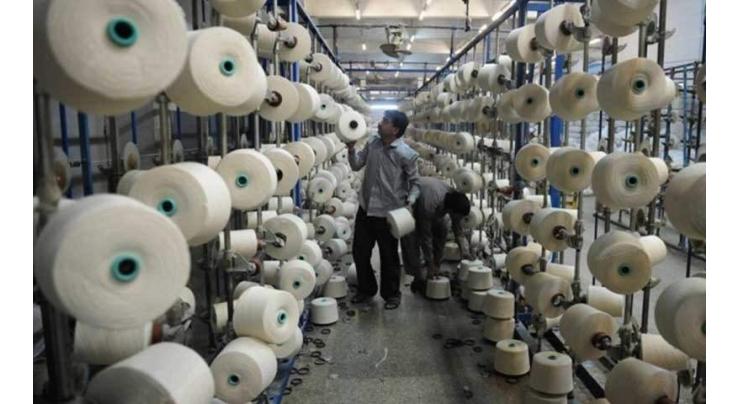
KPTMA Appreciates Govt's Business Friendly Policies
Muhammad Irfan Published December 06, 2021 | 07:10 PM

Khyber Pakhtunkhwa Textile Mills Association (KPTMA) Chairman Salim Saifullah Khan has appreciated the business friendly policies of the present government due to which textile exports during the last five months of the current fiscal year have reached all-time high exports of US $ 7.834 billion
PESHAWAR, (UrduPoint / Pakistan Point News - 6th Dec, 2021 ) :Khyber Pakhtunkhwa Textile Mills Association (KPTMA) Chairman Salim Saifullah Khan has appreciated the business friendly policies of the present government due to which textile exports during the last five months of the current fiscal year have reached all-time high exports of US $ 7.834 billion.
He mentioned that the textile exports of the current year have increased by 29 percent as compared to the exports of US $ 6.052 billion during the corresponding period of the last year, said a press release issued here on Monday.
Salim Saifullah Khan was pleased to witness that the textile exports in November 2021 were around US $ 1.747 billion which is 36 percent higher as compared to US $ 1.286 billion.
The textile exports in the financial year 2021 have increased by 23 percent and crossed over US $ 15.
4 billion as compared to the preceding year during which textile exports was US $ 12.526 billion.
He said increase in exports of Pakistan in general and textile exports during the current fiscal year, in particular is the result of the pro-business policies of the government for which we are very thankful to the government.
He urged the government to continue with the current policies and if possible revise the discount rate to 6 percent per annum and also provide special tariff of electricity and gas to the export-oriented textile industry which would lead to a further increase in exports thereby minimizing the trade deficit and improving the current account deficit.
He requested the government to continue the supply of the gas to the export-oriented sectors and co-opt the energy policies and prices followed in the neighboring countries.
Related Topics
Recent Stories

Bismah Maroof announces immediate retirement from international cricket

Malala expresses unwavering support for Gaza people

Selection committee dissolved over Pakistan women cricket team's poor performanc ..

Punjab CM Maryam Nawaz in police uniform at Chung police center

Currency Rate In Pakistan - Dollar, Euro, Pound, Riyal Rates On 25 April 2024

Today Gold Rate in Pakistan 25 April 2024

Mired in crisis, Boeing reports another loss

Session Awarding Ceremony 2024 held at Cadet College Muzaffarabad

Austrian ski great Hirscher to make comeback under Dutch flag

Pakistan, Japan agrees to convene 'Economic Policy Dialogue'

FM Dar conveys deepest sympathy on torrential rains devastation in UAE

Spain PM Sanchez says weighing resignation after wife's graft probe
More Stories From Business
-
Mining giant BHP launches bid to take over rival Anglo American
12 minutes ago -
Gold rates up by Rs500 per tola to Rs242,500
1 hour ago -
Tokyo stocks end lower after Meta results
2 hours ago -
EXCHANGE RATES FOR CURRENCY NOTES
3 hours ago -
Foreign exchange rates
3 hours ago -

Currency Rate In Pakistan - Dollar, Euro, Pound, Riyal Rates On 25 April 2024
5 hours ago
-

Today Gold Rate in Pakistan 25 April 2024
5 hours ago -
Meta profits soar but costs of AI cause worry
6 hours ago -

Mired in crisis, Boeing reports another loss
14 hours ago -

Pakistan, Japan agrees to convene 'Economic Policy Dialogue'
15 hours ago -

British-Pakistani firm unveils $35 million luxury apartments for overseas Pakistanis in Islamabad
15 hours ago -

European stocks lose momentum after global rally
15 hours ago











